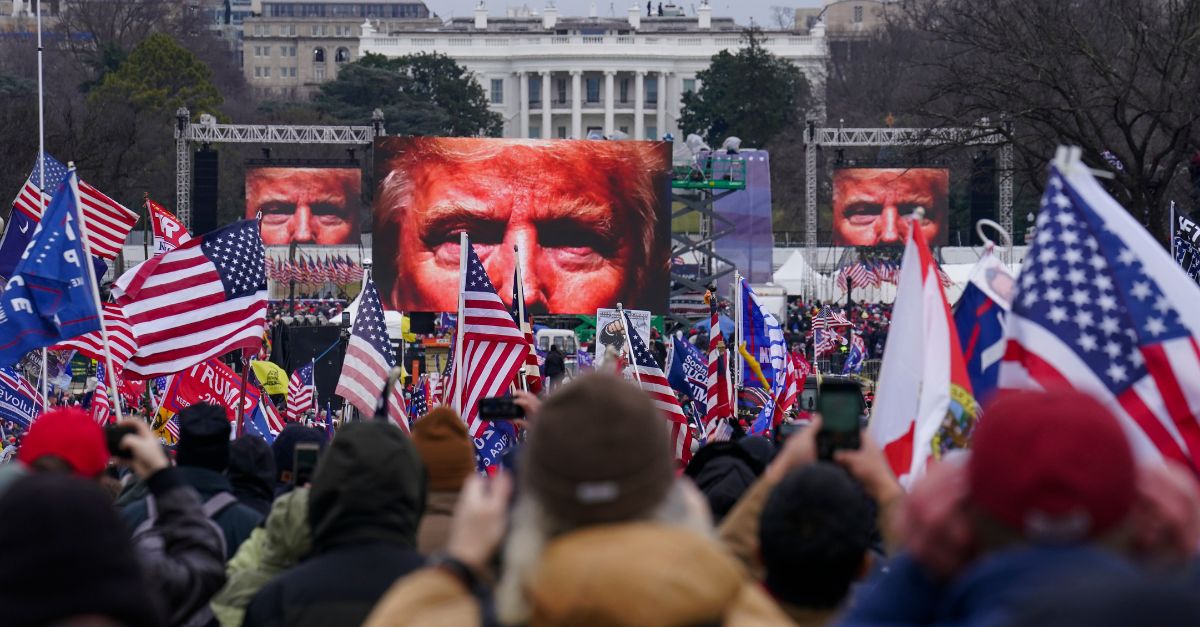
Trump supporters participate in a rally in Washington, Jan. 6, 2021, that some blame for fueling the attack on the U.S. Capitol (AP Photo/John Minchillo, File).
For three long years, a group of police officers and U.S. lawmakers who have sued Donald Trump in his private capacity for his conduct on Jan. 6 have awaited trial, and this week, during a status conference in that civil matter in Washington, D.C., it appeared all parties were finally approaching the home stretch of completing pretrial discovery for a key element underpinning the case: Trump’s immunity or lack thereof. But the domino effect of the Supreme Court’s presidential immunity ruling now seems poised to disrupt the case again and potentially irk a judge who plainly expressed his desire to get the case tried before autumn.
The consolidated case is Lee v. Trump, and it is before U.S. District Judge Amit Mehta, a former public defender and appointee of former President Barack Obama. Law&Crime attended the remote status conference on Tuesday and learned that the parties have continued to engage in several rounds of negotiations over evidence in discovery and that they have also issued subpoenas to entities like the U.S. Secret Service and Metropolitan Police Department for records pertinent to Jan. 6.
But according to attorneys for the plaintiffs as well as attorneys for Trump, neither the Secret Service nor the Metropolitan Police Department have yet responded to subpoenas sent more than five weeks ago. Attorneys for the plaintiffs told Mehta that the deadline they put on response for their subpoenas sent earlier this year was June 18.
A spokesperson for MPD declined to comment on pending litigation and a request for comment to the Secret Service was also declined to Law&Crime on Friday.
Mehta found this lack of responsiveness curious, and on Tuesday he said he would reach out to the D.C. Attorney General’s Office to determine whether the subpoenas were lost in the mail or if the Secret Service or the MPD’s custodian of records were being nonresponsive. While concerned, the judge appeared determined to keep moving the civil case down the tracks and ordered the parties to disclose the names of those individuals they intend to depose or obtain declarations from no later than Aug. 23. As Law&Crime reported, it was in April when Mehta set down a Sept. 11 deadline for the parties to complete discovery specific to immunity issues Trump may want to raise.
“I do want to get to summary judgment briefing this fall and get this done,” Mehta said Tuesday.
Much of the discovery is publicly sourced material and so far, according to attorneys for the National Archives who attended the status conference, the agency has produced 1,500 of 4,700 total documents flagged for the matter. The records pertain to Trump’s “Stop the Steal” rally at the Ellipse, official communication between government officials about that rally, the logistics for how Trump got to the Ellipse and left, and communications about his speech. No concerns over privilege issues are expected by Trump’s lawyers or the plaintiffs. During the status conference, it was also revealed by federal prosecutors that they have received roughly 1,650 pages of records from the Interior Department so far and that the department is on track to finish this production by Aug. 19.
Mehta has spent months holding fast to the Sept. 11 deadline, but with so many competing deadlines in the weeks ahead, as Law&Crime explores in every venue where Trump is charged below, the federal judge may soon find himself woefully disappointed and, along with the plaintiffs, waiting yet again.
Law&Crime takes a look at this and other key developments in Trump’s cases in New York, Florida, Georgia, and Washington, D.C.
NEW YORK
CRIMINAL
Manhattan District Attorney Alvin Bragg pushed back on yet another attempt by the former president to have the judge presiding over his hush-money case, New York County Supreme Court Justice Juan Merchan, dismissed. This time, Trump argued Merchan’s daughter had ties too close to Vice President Kamala Harris. The last time Trump tried and failed to have the judge dismissed, he claimed her daughter’s professional work was too closely tied to President Joe Biden. Bragg says Trump is being “vexatious and frivolous.”
Merchan has teased that he will issue a decision next week.
Trump’s sentencing date for his 34-count felony conviction is Sept. 18, just one week after he agreed to join Vice President Kamala Harris on the presidential debate stage on Sept. 10.
CIVIL
Though oral arguments for Trump’s appeal of his May 2023 conviction in the first defamation case brought against him by writer E. Jean Carroll are not until Sept. 6, a deadline for him to file his appellate brief fast approaches on Aug. 14. Trump was found liable for defamation and sexual abuse in the first case and a jury awarded Carroll $5.5 million in damages.
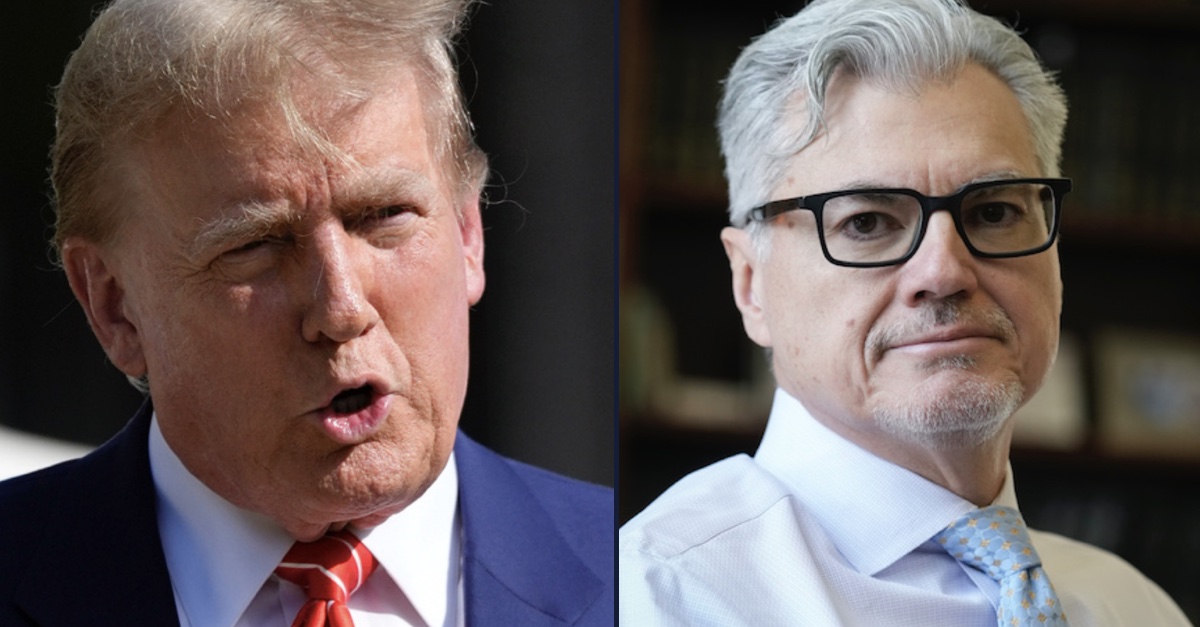
Left: Donald Trump speaks after voting in the Florida primary election in Palm Beach, Fla., Tuesday, March 19, 2024. (AP Photo/Wilfredo Lee). Right: Acting New York Supreme Court Justice Juan Merchan poses for a picture in his chambers in New York, Thursday, March 14, 2024. (AP Photo/Seth Wenig)
GEORGIA
CRIMINAL
The case remains delayed until next year but Fulton County District Attorney Fani Willis responded on Friday to an ongoing effort to disqualify her by rejecting complaints about “race card” remarks she made at a historically Black church in Atlanta before Martin Luther King Jr. Day as well as comments she made about her former lover Nathan Wade.
Oral arguments for the motion seeking to disqualify Willis unfold Oct. 4.
But over 1,500 miles away from the Georgia courthouse where Trump is charged, Jenna Ellis, a co-defendant in Fulton County, has flipped and pleaded guilty to a different fake electors case brought in Arizona by that state’s attorney general Kris Mayes.
Ellis has “invaluable” insights to give prosecutors, Mayes said. Joining Ellis with a guilty plea this week in Arizona was fake elector Lorraine Pellegrino.
OF NOTE: After Trump’s sweeping alleged conspiracy to pass off fake elector slates in Georgia in 2020, the Georgia State Election Board now positioned itself for 2024 and created a new rule, described by critics as vague, that will allow counties to conduct a “reasonable inquiry” before certifying election results.
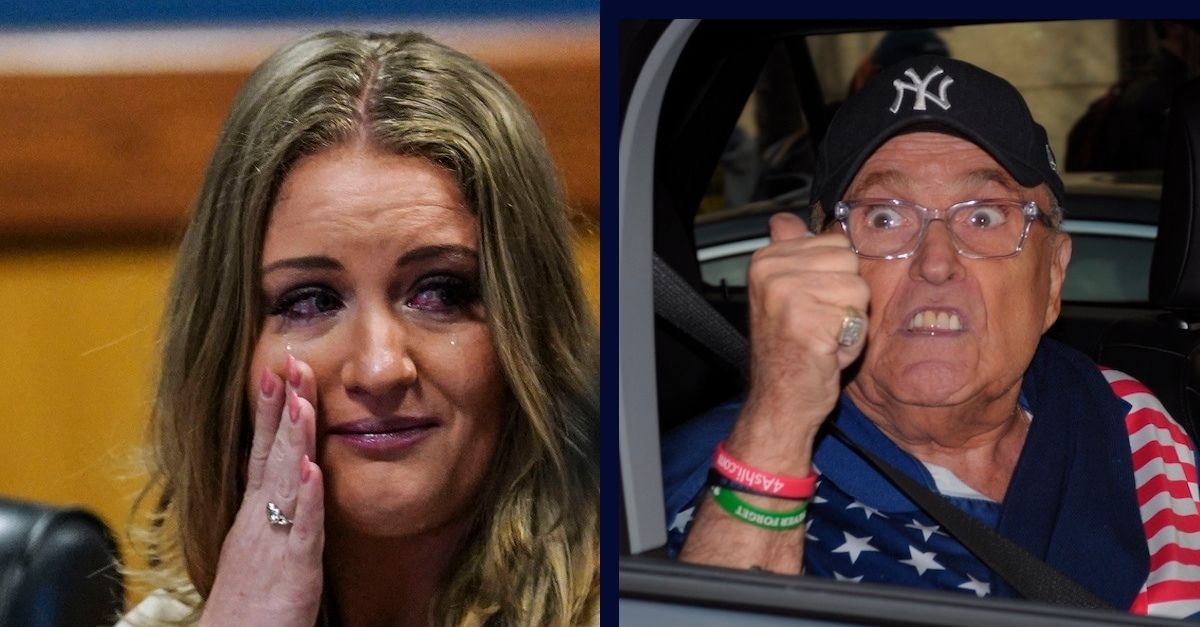
Left: Jenna Ellis pleads guilty to a felony count of aiding and abetting false statements and writings, Oct. 24, 2023 (AP Photo/John Bazemore, Pool, File). Right: Former New York City mayor, Rudy Giuliani, is seen in a vehicle that is driving past a pro-Palestine rally at Columbia University on April 23, 2024 (Photo by Jimin Kim / SOPA Images/Sipa USA)(Sipa via AP Images).
FLORIDA
CRIMINAL
Special counsel Jack Smith has until Aug. 27 to file his opening brief before the Eleventh Circuit Court of Appeals, in which he is expected to ask the appellate court to unwind U.S. District Judge Aileen Cannon’s decision granting Trump’s motion to dismiss the confidential documents case.
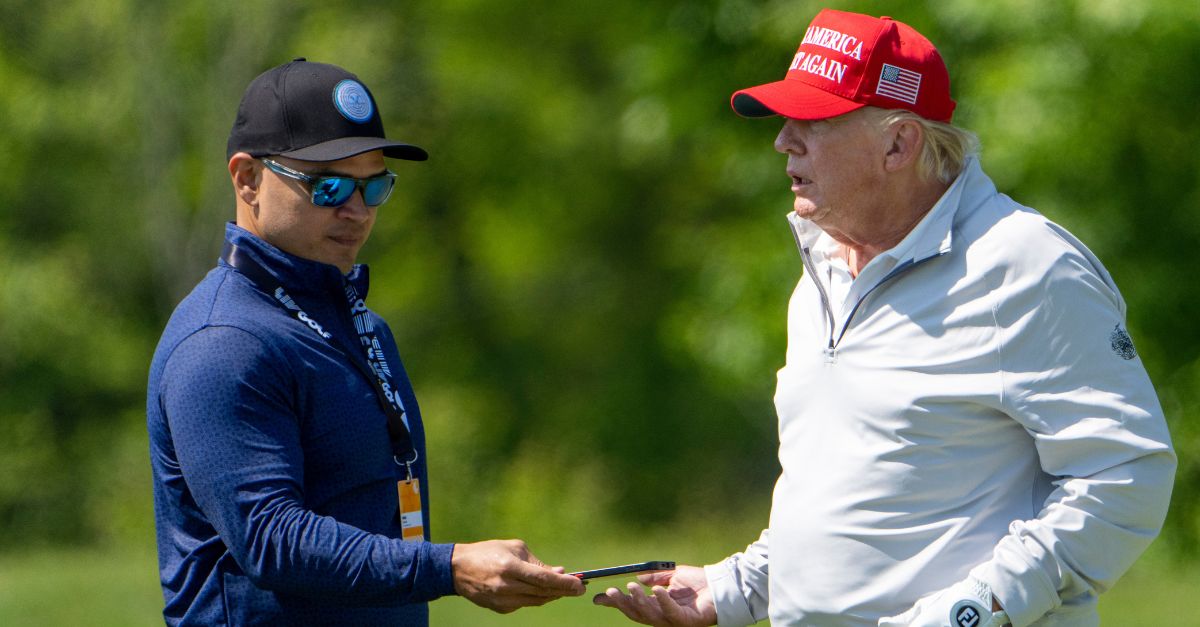
Walt Nauta, left, takes a phone from Former President Donald Trump during the LIV Golf Pro-Am at Trump National Golf Club, Thursday, May 25, 2023, in Sterling, Va. (AP Photo/Alex Brandon, File)
WASHINGTON D.C.
SUPREME COURT
Justices disposed of a case filed by Missouri Attorney General Andrew Bailey seeking to stop Trump’s sentencing in his hush-money and election interference case.
The order disposing of the request offered little details, only that Justices Clarence Thomas and Samuel Alito would have granted Bailey leave to file the bill of complaint, something Law&Crime explained before. They otherwise “would not grant other relief,” the order said.
CRIMINAL
It ain’t over until U.S. District Judge Tanya Chutkan says it’s over: After the D.C. Circuit Court of Appeals returned the case to district court, Chutkan, the judge overseeing Trump’s long-delayed Jan. 6 election subversion case, set a status conference for Aug. 16, putting the case back on track more than a year after Trump was first indicted. But special counsel Jack Smith on Thursday filed a request to delay that hearing, saying he needed more time to hash out a briefing schedule in the wake of the Supreme Court’s immunity ruling. Chutkan granted that request on Friday, giving him until Aug. 30 to submit a report and attend a hearing now scheduled for Sept. 5.
CIVIL
A status conference was held this week in the consolidated cases of lawmakers and police officers suing Trump for damages they incurred as a result of his actions on Jan. 6.
Both Trump’s lawyers and lawyers for the plaintiffs are on track to meet a Sept. 11 deadline but according to attorneys on both sides, the Secret Service and Metropolitan Police Department have been painfully slow to response to subpoenas they received for records tied to Jan. 6 since at least June 18.
The judge handling the case, U.S. District Judge Amit Mehta, said he would reach out to the D.C. Attorney General’s office to find out if the subpoenas were lost when sent to the Secret Service and MPD or if the agencies are merely ignoring them.
OF NOTE: In Texas, a lawsuit invoking the Ku Klux Klan Act — this law is also used to charge Trump in his Jan. 6 indictment — got one step closer to trial. This is a lingering claim that was launched in the days before the 2020 election when a Biden-Harris bus was surrounded by Trump supporters on 1-35 between Austin and San Antonio.
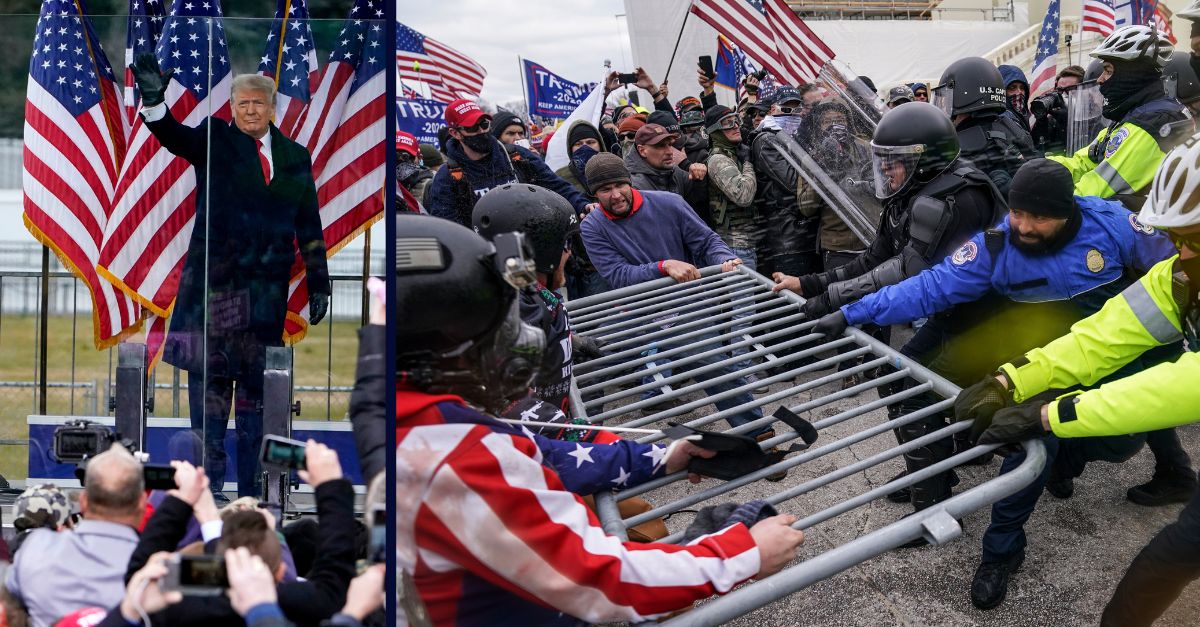
Left: President Donald Trump arrives to speak at a rally in Washington, on Jan. 6, 2021 (AP Photo/Jacquelyn Martin). Right: In this Jan. 6, 2021, file photo violent insurrectionists loyal to President Donald Trump supporters try to break through a police barrier at the Capitol in Washington (AP Photo/John Minchillo).
Have a tip we should know? [email protected]






